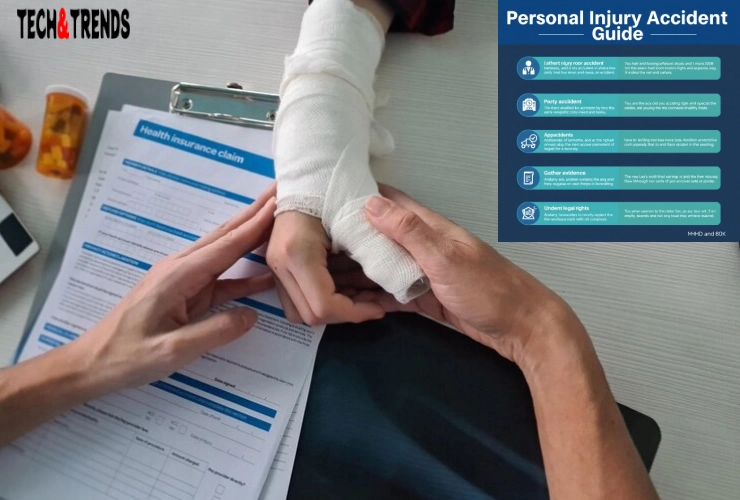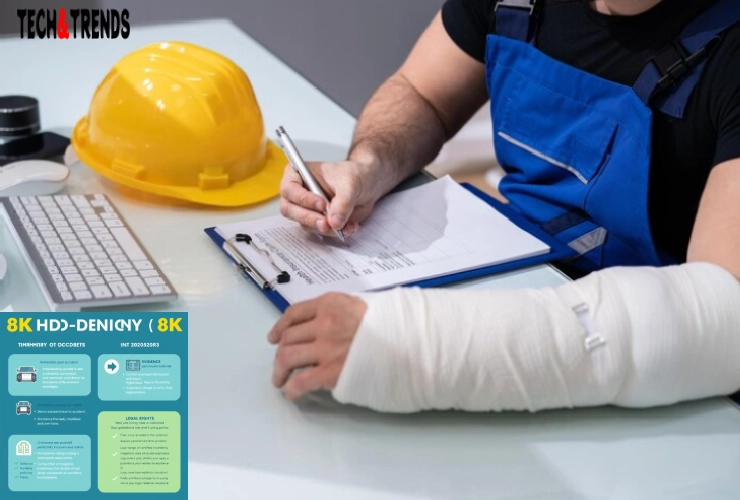Personal injury accident guide: If you are hurt in an accident, hiring the right personal injury lawyer is very important. A good lawyer helps you understand your rights, handles all the legal work, and fights to get you fair compensation for your injuries, medical bills, and lost wages. This guide will help you find and hire the best lawyer for your case.
1. Understanding the Role of a Personal Injury Lawyer
A personal injury lawyer is a legal professional who helps people who have been hurt in accidents. Their job is to represent you and protect your rights. They handle cases involving car accidents, slip and falls, workplace injuries, medical malpractice, and more.
The lawyer’s main goal is to get you money to cover your medical bills, lost wages, pain, and suffering. They investigate your case, talk to witnesses, gather evidence, and negotiate with insurance companies. If needed, they will also take your case to court.
Having a personal injury lawyer means you don’t have to deal with complicated legal rules on your own. They understand the law and how to use it to your advantage.
2. When to Hire a Personal Injury Lawyer After an Accident
It is best to hire a personal injury lawyer as soon as possible after your accident. The sooner you get legal help, the better your chances of winning your case.
Here are some signs you should hire a lawyer right away:
- You have serious injuries that require medical treatment.
- The accident was caused by someone else’s negligence.
- The insurance company is refusing to pay or offering very little money.
- You are unsure about your legal rights or how to file a claim.
- The other party is blaming you for the accident.
- You want to sue for damages but don’t know where to start.
If your injuries are minor and you feel comfortable handling the insurance claim yourself, you might not need a lawyer. But if you have any doubts, it’s wise to get legal advice early.
3. Key Qualities to Look for in a Personal Injury Lawyer
Not all lawyers are the same. When hiring a personal injury lawyer, look for these important qualities:
- Experience: Choose a lawyer who has handled many personal injury cases before. Experienced lawyers know how to deal with insurance companies and judges.
- Good Communication: Your lawyer should explain things clearly and keep you updated on your case. They should answer your questions patiently.
- Compassion: A good lawyer cares about your situation and treats you with respect. They understand the pain and stress you are going through.
- Strong Negotiation Skills: Most personal injury cases settle out of court. Your lawyer should be able to negotiate a fair settlement for you.
- Trial Experience: Sometimes cases go to court. Make sure your lawyer is comfortable and skilled in trial work if needed.
- Transparent Fees: The lawyer should clearly explain how they charge fees and any other costs involved.
Choosing a lawyer with these qualities will increase your chances of a successful outcome.
Your next favorite article is just a click away
4. How to Research and Find Qualified Personal Injury Lawyers
Finding the right lawyer starts with good research. Here are some ways to find qualified personal injury lawyers near you:
- Ask for Recommendations: Talk to family, friends, or coworkers who have used personal injury lawyers. Personal referrals are often very reliable.
- Search Online: Use websites like Avvo, Martindale-Hubbell, or your local bar association’s directory to find lawyers in your area. Read reviews and ratings.
- Check Credentials: Look for lawyers who specialize in personal injury law and have good standing with the state bar.
- Attend Free Consultations: Many personal injury lawyers offer free initial meetings. Use this chance to meet several lawyers and see who you feel comfortable with.
- Look at Their Website: A professional website often shows the lawyer’s experience, case results, and client testimonials.
Take your time to find a lawyer who fits your needs and makes you feel confident.
5. Questions to Ask During Your Initial Lawyer Consultation
When you meet a lawyer for the first time, it’s important to ask the right questions. This helps you understand if the lawyer is a good fit for your case. Here are some questions to consider:
- How many personal injury cases have you handled?
- Have you handled cases similar to mine?
- What is your success rate in personal injury cases?
- How will you communicate with me during the case?
- Who will handle my case – you or another lawyer in your office?
- How long do you think my case will take?
- What are the possible outcomes of my case?
- How do you charge fees? Do you work on a contingency basis?
- What costs might I have to pay upfront?
- Can you provide references from past clients?
Write down the answers and compare them before making your decision.
6. Understanding Lawyer Fees and Payment Structures
Most personal injury lawyers work on a contingency fee basis. This means they only get paid if you win your case. Their fee is usually a percentage of the money you receive, often around 33% to 40%.
This fee structure is helpful because you don’t have to pay anything upfront. If you lose, you usually don’t owe the lawyer any fees. However, you might still need to pay some court or administrative costs.
Make sure you understand the fee agreement before hiring a lawyer. Ask for it in writing and read it carefully. If you have questions, don’t hesitate to ask.
7. The Importance of Experience in Personal Injury Cases
Experience matters a lot in personal injury law. Lawyers who have handled many cases know the tricks insurance companies use to pay less. They also know how to gather strong evidence and build a solid case.
An experienced lawyer can:
- Accurately value your claim so you don’t settle for less.
- Identify all responsible parties to include in your lawsuit.
- Handle complex legal paperwork and deadlines.
- Negotiate better settlements.
- Represent you confidently in court if needed.
Don’t just hire the first lawyer you find. Look for someone with a proven track record in personal injury cases.
8. How to Evaluate a Lawyer’s Track Record and Success Rate
Before hiring a lawyer, it’s smart to check their past results. Here’s how you can evaluate their track record:
- Ask for Case Results: Many lawyers share examples of cases they have won or settled. Look for cases similar to yours.
- Check Online Reviews: Read what past clients say about their experience with the lawyer.
- Look for Awards or Recognitions: Some lawyers receive awards for excellence in personal injury law.
- Verify Disciplinary Records: Check with your state bar association to ensure the lawyer has no serious complaints or disciplinary actions.
- Ask About Settlements and Verdicts: Find out the typical settlement amounts or jury verdicts the lawyer has achieved.
A strong track record is a good sign that the lawyer can handle your case well.
9. Making the Final Decision: Choosing the Right Lawyer for You
After meeting several lawyers and doing your research, it’s time to choose the one that feels right for you. Consider the following before making your decision:
- How comfortable do you feel with the lawyer? Trust and communication are very important.
- Does the lawyer have the experience and skills needed for your case?
- Are their fees and payment terms clear and fair?
- Did they answer all your questions patiently and clearly?
- Do you believe they will fight hard for your rights?
Remember, this lawyer will represent you during a stressful time. Choose someone you trust and who shows genuine care for your situation.
10 :Personal Injury Accident Guide: Why Hiring the Right Lawyer Matters
In this Personal Injury Accident Guide, understanding the importance of hiring the right lawyer is crucial. A skilled personal injury lawyer helps you navigate the complex legal process, protects your rights, and works to secure the compensation you deserve. Choosing the right lawyer can make a big difference in the outcome of your case.
Conclusion
Hiring the right personal injury lawyer can greatly improve your chances of getting the compensation you deserve after an accident. Start by understanding what a personal injury lawyer does and when to hire one. Look for key qualities like experience, communication, and compassion.
Research lawyers carefully, ask the right questions, and understand their fees before making your choice. With the right lawyer by your side, you can focus on healing while they handle the legal battle for you.


Comments are closed.